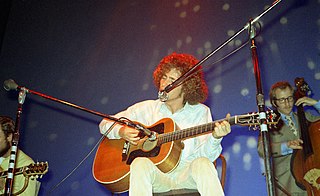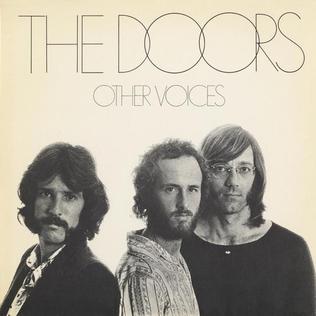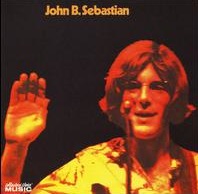Related Research Articles

An extended play record, usually referred to as an EP, is a musical recording that contains more tracks than a single but fewer than an album or LP record. Contemporary EPs generally contain four or five tracks, and are considered "less expensive and time-consuming" for an artist to produce than an album. An EP originally referred to specific types of records other than 78 rpm standard play (SP) and LP, but it is now applied to mid-length CDs and downloads as well.

Elektra Records is an American record label owned by Warner Music Group, founded in 1950 by Jac Holzman and Paul Rickolt. It played an important role in the development of contemporary folk and rock music between the 1950s and 1970s. In 2004, it was consolidated into WMG's Atlantic Records Group. After five years of dormancy, the label was revived as an imprint of Atlantic in 2009. In October 2018, Elektra was detached from the Atlantic Records umbrella and reorganized into Elektra Music Group, once again operating as an independently managed frontline label of Warner Music. In June 2022, Elektra Music Group was merged with 300 Entertainment to create the umbrella label 300 Elektra Entertainment (3EE), though both Elektra and 300 continued to maintain their separate identities as labels.

Nuggets: Original Artyfacts from the First Psychedelic Era is a compilation album of American psychedelic and garage rock singles that were released during the mid-to-late 1960s. It was created by Lenny Kaye, who was a writer and clerk at the Village Oldies record shop in New York. He would later become the lead guitarist for the Patti Smith Group. Kaye produced Nuggets under the supervision of Elektra Records founder Jac Holzman. Kaye conceived the project as a series of roughly eight LP installments focusing on different US regions, but Elektra convinced him that one double album would be more commercially viable. It was released on LP by Elektra in 1972 with liner notes by Kaye that contained one of the first uses of the term "punk rock". It was reissued with a new cover design by Sire Records in 1976. In the 1980s, Rhino Records issued Nuggets in a series of fifteen installments, and in 1998 as a 4-cd box set.

Timothy Charles Buckley III was an American musician. His music and style changed considerably through the years. Buckley began his career based in folk music, but his subsequent albums experimented with jazz, psychedelia, funk, soul, the avant-garde, and an evolving voice-as-instrument sound. He died at the age of 28 from a heroin and morphine overdose, leaving behind sons Taylor and Jeff.

Other Voices is the seventh studio album by the Doors, released by Elektra Records in October 1971. It was the first album released by the band following the death of lead singer Jim Morrison in July 1971 with keyboardist Ray Manzarek and guitarist Robby Krieger sharing lead vocals. Tracks for the album had begun before Morrison's death and the band hoped that Morrison would return from Paris to finish them.

Warner Music Group Corp. is an American multinational entertainment and record label conglomerate headquartered in New York City. It is one of the "big three" recording companies and the third-largest in the global music industry, after Universal Music Group (UMG) and Sony Music Entertainment (SME). Formerly part of Time Warner, WMG was publicly traded on the New York Stock Exchange from 2005 until 2011, when it announced its privatization and sale to Access Industries. It later had its second IPO on Nasdaq in 2020, once again becoming a public company. With a multibillion-dollar annual turnover, WMG employs more than 3,500 people and has operations in more than 50 countries throughout the world.
Pye Records was a British record label. Its best known artists were Lonnie Donegan (1956–1969), Petula Clark (1957–1971), the Searchers (1963–1967), the Kinks (1964–1971), Sandie Shaw (1964–1971), Status Quo (1968–1971) and Brotherhood of Man (1975–1979). The label changed its name to PRT Records in 1980, before being briefly reactivated as Pye Records in 2006.
Warner Records Inc. is an American record label. A subsidiary of the Warner Music Group, it is headquartered in Los Angeles, California. It was founded on March 19, 1958, as the recorded music division of the American film studio Warner Bros.

Nonesuch Records is an American record company and label owned by Warner Music Group, distributed by Warner Records, and based in New York City. Founded by Jac Holzman in 1964 as a budget classical label, Nonesuch has developed into a label that records critically acclaimed music from a wide range of genres. Robert Hurwitz was president of the company from 1984 to 2017.

Jac Holzman is an American music businessman, best known as the founder, chief executive officer and head of record label Elektra Records and Nonesuch Records. Holzman commercially helped launch the CD and home video formats, as well as the pilot program which became MTV. He was inducted into the Rock and Roll Hall of Fame in 2011.
Music for Pleasure and Classics for Pleasure (CFP) were British record labels that issued budget-priced albums of popular and classical music respectively. Albums were subsequently released under the MFP label in Australia (MFP-A) and South Africa.

The Rock Machine Turns You On was the first bargain priced sampler album. It was released in the UK, Australia, New Zealand, Canada, South Africa, The Netherlands, Germany and a number of other European countries in 1968 as part of an international marketing campaign by CBS, the Columbia label then active in Europe, Australia, New Zealand and South Africa.

What's Shakin' is a compilation album released by Elektra Records in May 1966. It features the earliest studio recordings by the Lovin' Spoonful and the Paul Butterfield Blues Band, as well as the only released recordings by the ad hoc studio group Eric Clapton and the Powerhouse, until they were reissued years later.

The Doors: Vinyl Box Set is the seventh box set for American rock band the Doors. It is a seven-record set of the original six studio albums, remastered in stereo from the original analogue tapes and pressed on 180-gram HQ vinyl, and a mono version of the debut album. Artwork, packaging, and inner sleeves are replicas of the original LPs issued between 1967 and 1971. The albums were remastered from 192k/24 bit digital copies and pressed at Record Technology (RTI). An insert booklet includes notes from Jac Holzman, founder of Elektra Records and Bruce Botnick the Doors' longtime sound engineer/co-producer on all the original studio albums.
Robert Alan Krasnow was an American record label executive and entrepreneur who had a long and successful career in the music industry. He founded Blue Thumb Records, later became chairman of Elektra Records, and was a co-founder of the Rock and Roll Hall of Fame.

The Original Delaney & Bonnie, also known by its subtitle Accept No Substitute, is the second studio album by American recording duo Delaney & Bonnie. It was recorded with many of the "friends" that would form the core of their best-known 1969–70 touring band, including Bobby Whitlock, Carl Radle and Rita Coolidge.
The Warner/Reprise Loss Leaders were a series of promotional sampler compilation albums released by Warner Bros. Records throughout the 1970s. Each album contained a wide variety of tracks by artists under contract to Warner Bros. and its subsidiary labels ; often these were singles, B-sides, non-hit album tracks, or otherwise obscure material, all designed to arouse interest in the artists' regular albums. Also found on some were humorous, bizarre interstitial audio material—clips from old records and movies, short skits, found sound, etc.--and most albums featured clever, humorous cover art and liner notes. Most of the 1970s albums were compiled and annotated by Barry Hansen, better known as Dr. Demento.

John B. Sebastian is the debut album by American singer-songwriter John Sebastian, previously best known as the co-founder and primary singer-songwriter of the 1960s folk-rock band the Lovin' Spoonful. The album, released in January 1970, includes several songs that would become staples of Sebastian's live performances during the early and mid-1970s. Most notably, the album included "She's a Lady", Sebastian's first solo single, and an alternate version of "I Had a Dream" which was used to open the soundtrack album of the 1970 documentary film Woodstock. John B. Sebastian also featured support performances by David Crosby, Stephen Stills and Graham Nash several months before that trio agreed to work together as a performing unit.
A compilation album comprises tracks, which may be previously released or unreleased, usually from several separate recordings by either one performer or by several performers. If the recordings are from one artist, then generally the tracks were not originally intended for release together as a single work, but may be collected together as a greatest hits album or box set. If the recordings are from several artists, there may be a theme, topic, time period, or genre which links the tracks, or they may have been intended for release as a single work—such as a tribute album. When the tracks are by the same recording artist, the album may be referred to as a retrospective album or an anthology.
William Stanley Harvey was an American graphic designer and art director, responsible for the design of Elektra Records' logos and many of its album covers between the 1950s and 1970s including those by Love, The Doors, MC5, The Stooges, Judy Collins, Tim Buckley and others.
References
- ↑ Jac Holzman and Gavin Daws, Follow The Music, 1998, ISBN 0-9661221-1-9, pp.31-32
- ↑ Elektra discography
- ↑ The last "mainstream" sampler, issued as a disc or CD was arguably the ZTT Records sampler of 1985